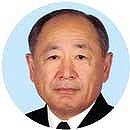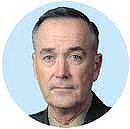Immediately after Onaga inauguration, SDF Chief of Joint Staff Council “promised” Henoko to the US

Japan SDF Chief of Joint Staff Council Katsutoshi Kawano
September 3, 2015 Ryukyu Shimpo
It recently came to light that on December 17-18 of last year, when Japan Self Defense Force Chief of Staff of the Joint Staff Council Katsutoshi Kawano visited the United States, he spoke to U.S. Marine Corps Commandant Joseph Dunford regarding the planned relocation of Marine Corps Air Station Futenma to Henoko. Kawano told Dunford that while a governor opposing the relocation of Futenma had been elected in Okinawa, the Henoko relocation issue was a matter to be discussed at the national government level, thus there would be no change in the Japanese government’s policy. He stated his expectation that the Abe administration would take a strong stance in moving forward with the project.
The emergence of this “promise” from the highest JSDF official to the U.S. regarding the Henoko relocation, being made immediately after Governor Takeshi Onaga took office on December 10 after campaigning on a platform of opposition to the new base construction, is likely to generate debate.
The discussion between Kawano and Dunford was noted in classified Joint Staff Office documents acquired by the Japan Communist Party. The documents were compiled on December 24, 2014, titled “overview of meetings by chief of staff during U.S. visit,” and were classified as “restricted.”
The documents contain details of Kawano’s meetings with numerous U.S. officials, including Dunford, Deputy Secretary of Defense Robert Work, Army Chief of Staff Raymond Odierno, Air Force Vice Chief of Staff Larry Spencer, Chief of Naval Operations Jonathan Greenert, Navy Staff Director Scott Swift, and Chairman of the Joint Chiefs of Staff Martin Dempsey.
In his meeting with Dunford, Kawano also made comments implying that the U.S. may have interfered in Okinawa’s gubernatorial election last year, thanking Dunford for his efforts in implementing the Liberty Policy (behavioral guidelines restricting U.S. service members, including a curfew and restrictions on alcohol consumption) and taking consideration of the local political situation at the time of the election.
Dunford expressed his desire to see the relocation plan carried out, stating that this kind of issue requires patience, and that it would be necessary to wait for a favorable turn in the situation.
In his meeting with Deputy Defense Secretary Work, Kawano played down opposition to the deployment of the U.S. Marine Corps vertical takeoff and landing aircraft, saying that it is only a minority of activists who are attempting to raise safety concerns about the MV-22 Osprey.
(Translation by T&CT and Sandi Aritza)
Previous Article:Etsuko Abe to raise awareness nationwide of soil issues related to Henoko landfill
Next Article:GPS shows sea turtle drifted from Saipan to Kunigami
[Similar Articles]
- Governor Onaga asks Prime Minister to cancel construction of new US base at their first meeting
- Government halts work at sea for new US base in Henoko as it considers election
- Nago mayor critical of Prime Minister Abe’s “hardline stance”
- Scandinavian diplomats learn about Henoko issue from Nago Mayor
- Okinawa governor condemns helipad construction in Takae

 Webcam(Kokusai Street)
Webcam(Kokusai Street)


